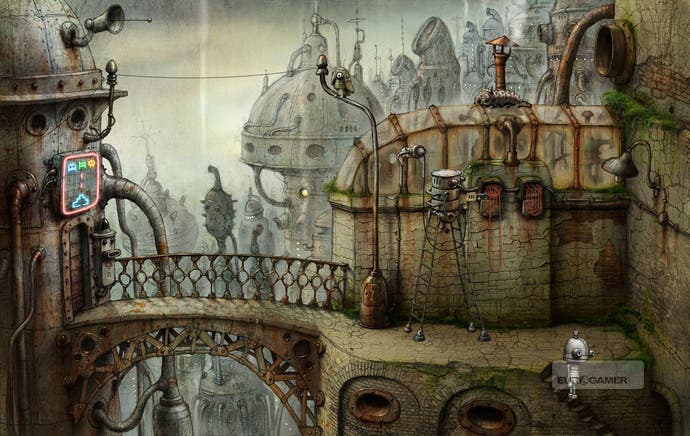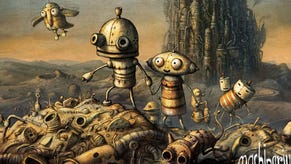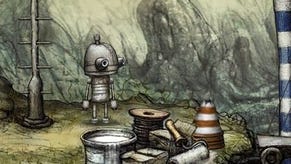Machinarium
The tin man finds a heart.
Machinarium, let's face it, is not a particularly friendly word. It conjures up images of grotty workshops, of automated slaughterhouses, and rusting, febrile dreamscapes full of the screech of metal on metal. Well, it does for me. I have some issues with visualisation.
What Machinarium certainly doesn't initially elicit for me is exactly what it turns out to be - an engagingly charming and beautiful point-and-click adventure world full of character, emotion and humanity. What makes this more remarkable is that the game largely unfolds in the sort of oxidised and ramshackle scrapyard the title suggests. Not that it's unattractive - wholly the opposite. Machinarium squeezes more charm from a quite roughly drawn automaton than the Walt Disney Corporation has from a legion of creepily anthropomorphised mammals.
What hits you first is the beauty, the attention to detail and intriguingly muted palette. Machinarium is a world of browns and greys, yet evokes a warmly fuzzy Saturday afternoon cartoon sensation which establishes both place and character with incredible visual efficiency. Of particular note is the animation of the nameless, googly-eyed protagonist. One of the mechanics of this innovative, 2D point-and-clicker is that your robot hero can contract or expand to interact with points of interest at different heights (hot-points and objects can only be clicked when in reach), and adopts a stiff-legged, stalking gait when expanded and a scuttling locomotive style when compact. These touches imbue the cylindrical android with charm, transforming him almost immediately from emotionless droid to whimsical underdog.

Every screen is a new delight, twisted cityscapes and quasi-industrial interiors contrasting beautifully with geriatric robots and the bumbling malcontents whose bullying mischief provide the necessary antagonism to sedately shuffle the story along. This narrative progression is helped along by short, un-voiced cut-scenes and simply animated speech-bubble exposition. It's no War and Peace, but complex character-development and moral intrigue would only serve to obscure Machinarium's message of simplistic enjoyment - a gilding of the lily's gorgeous patina.
The game begins with a short bit of back-story, essentially establishing the hero, villains and love interest, before tasking the player with assembling our cruelly dismembered hero as he begins his quest. Initially puzzles are gentle, pick-up-and-combine affairs, introducing the concept of the proximity necessary for interaction as you attempt to gain access to the Heath Robinson city where the majority of the game takes place. Things soon diverge from this inventory-filling, however, and more interesting and complex solutions are required. Before too long you'll be playing proto-Connect 4 with a metallic lush, rescuing dogs with plunger guns and getting your spanner on for a spot of improvised civic plumbing.









